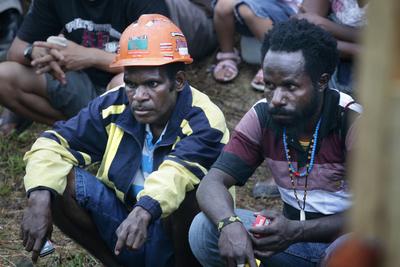President Yudhoyono recently met with Patrick Buffet, Chairman and CEO of the Eramet Group. Buffet explained that Eramet will spend US$450 million for the project’s development, and will invest up to US$6 billion on the entire project.
Indonesia is rich in minerals. It is the world’s second-largest producer of tin and nickel and the fourth-largest copper producer. The mining industry accounted for 10.8 per cent of Indonesia’s GDP in 2009, with minerals and related products constituting one-fifth of the country’s total exports. But Indonesia’s heavy reliance on natural resources to boost its economic growth may mislead the interpretation of ‘true’ increases in its social welfare. GDP growth based on the exploitation of natural capital can disguise an unsustainable decline in resources. The government and companies who exploit natural resources often fail to reinvest the resource rents generated. When rents are not effectively invested and the natural resources are not replaced with human-made capital to form the basis for future development, growth is unsustainable.
A classic example of a struggle to manage the exploitation of natural resources is Freeport, which has operated the largest gold mine on earth in West Papua, Indonesia, since the 1960s. Despite various allegations that the company was involved in human rights violations and environmental degradation, it gained political support from the New Order government by paying a modest portion of its earnings in the form of taxes, dividends and royalties. The initial contract started in 1967, and was meant to end in 1997. But in 1991 Soeharto’s government renewed it and then extended it for another 30 years, and allowed Freeport to obtain two ten-year extensions. Freeport’s contract will now end in 2041.
Despite the progress of democracy and continuing criticism from opposition parties and environmentalists, there seems to be no significant change in the way the Indonesian government deals with foreign companies’ intervention into Indonesia’s resource sectors.
Indonesia’s Chief Economic Minister Hatta Rajasa, after the meeting between the Eramet chief and President Yudhoyono, said that the project was part of the MP3EI Corridor 5 Development Plan. The Development Plan is designed to boost Indonesia’s GDP to approximately US$4.5 trillion by 2025. The government has identified six regions as economic corridors, with Papua and Maluku engaged in mining and fisheries. As part of the government’s ambitious Development Plan, Eramet’s nickel project clearly benefits from strong political support.
Under pressure to benefit local communities, Eramet will develop support facilities, including power and water treatment plants, and will use environmentally-friendly technology. Eramet has also managed to gain support from the World Bank by getting a US$207 million ‘aid’ guarantee to support the exploration and pre-construction phases. The World Bank’s support is condemned by environmentalists who argue that the project will destroy a large area of protected forest. Mine waste also threatens massive contamination of streams, rivers and the ocean in Weda Bay.
The opening of a new site will always provide job opportunities. But many of these positions will offer high salaries to skilled workers, so their requirements can only be met by graduates from the top universities in Indonesia, mainly from Java Island. There is little chance for local people to compete for these jobs. That the main occupations of local people are fishermen and farmers further implies that environmental degradation would adversely impact their income.
Conflicts between local people and the mining companies in Halmahera have been recorded multiple times, and the military is often required to secure the mining areas. On top of a series of inter-religious conflicts in Maluku, this nickel project will increase tension in the region, and leave a huge task for the government to ensure that the project benefits local communities. Whilst regulations to ensure sustainable and community-based development already exist, problems of law enforcement and the government’s political resolve remain.
Risti Permani is a Postdoctoral Research Fellow at the School of Economics at the University of Adelaide.

